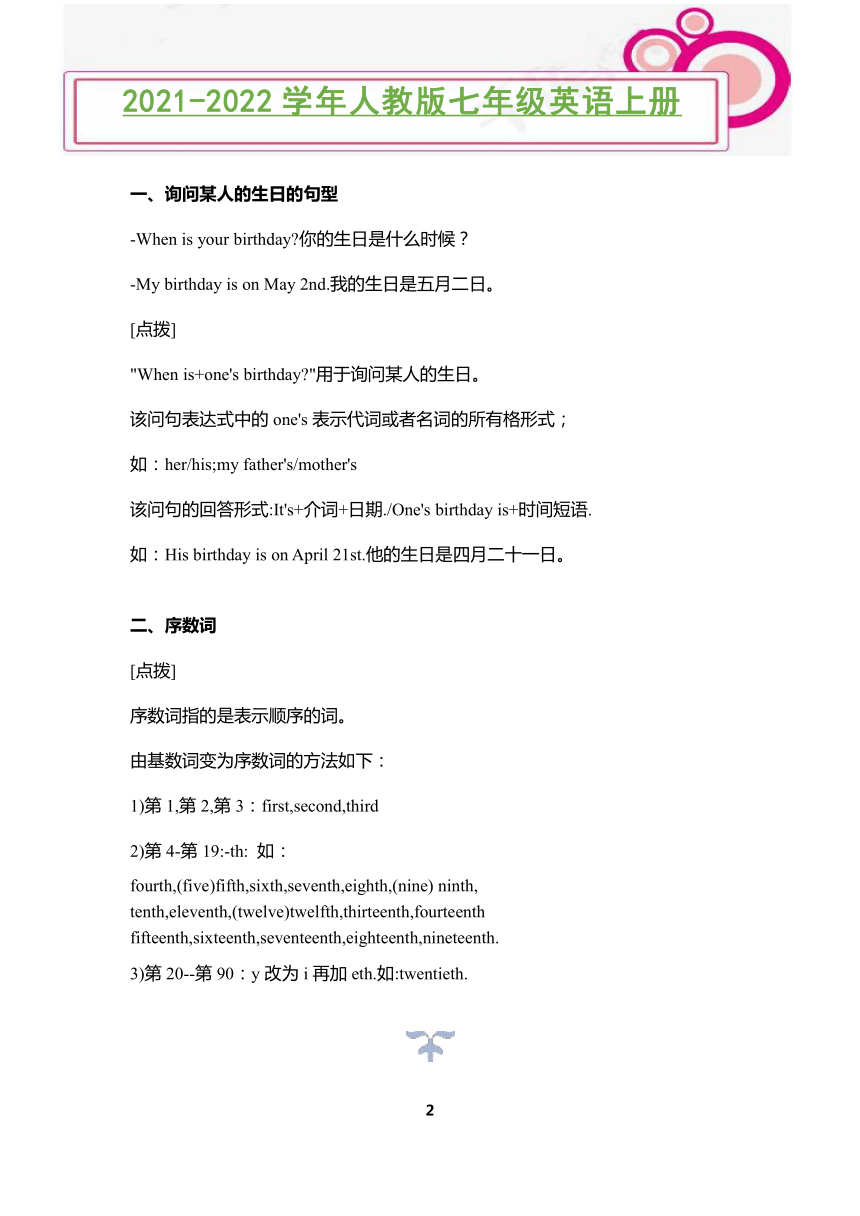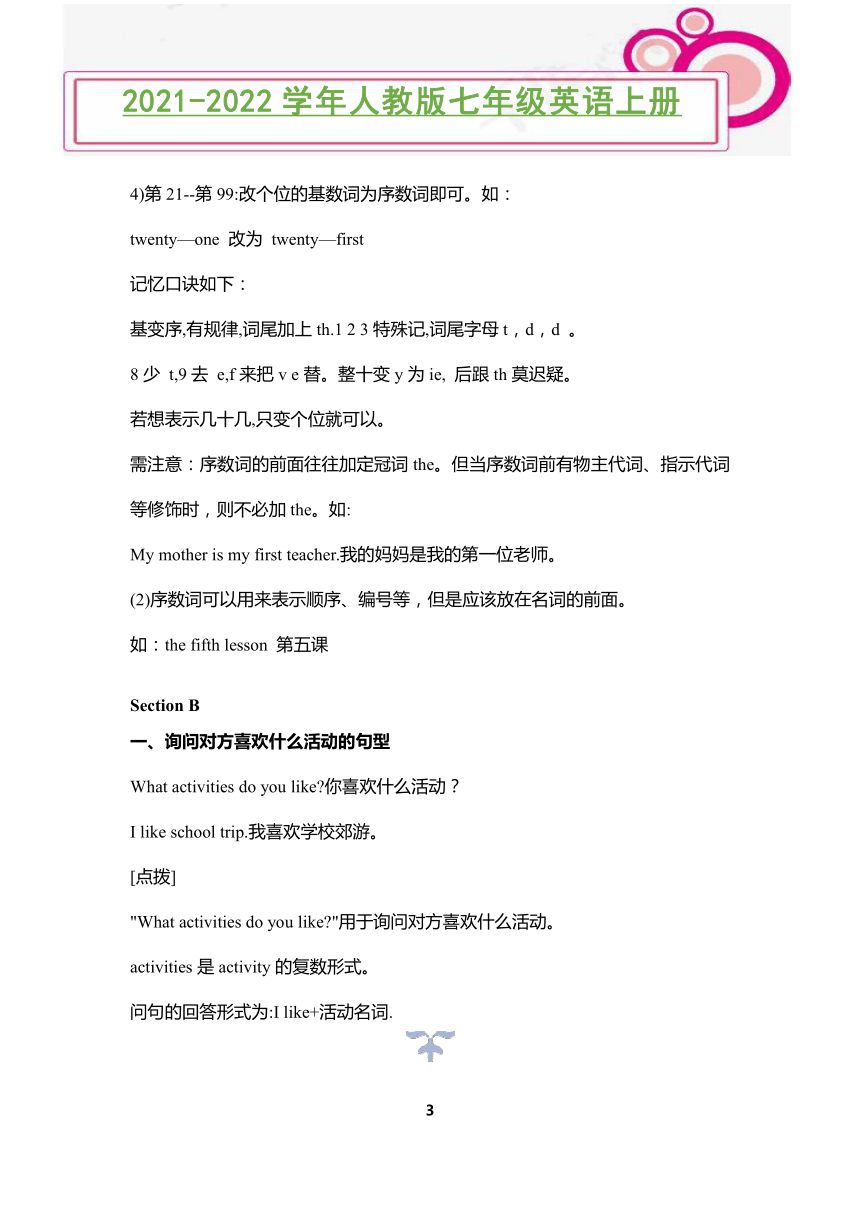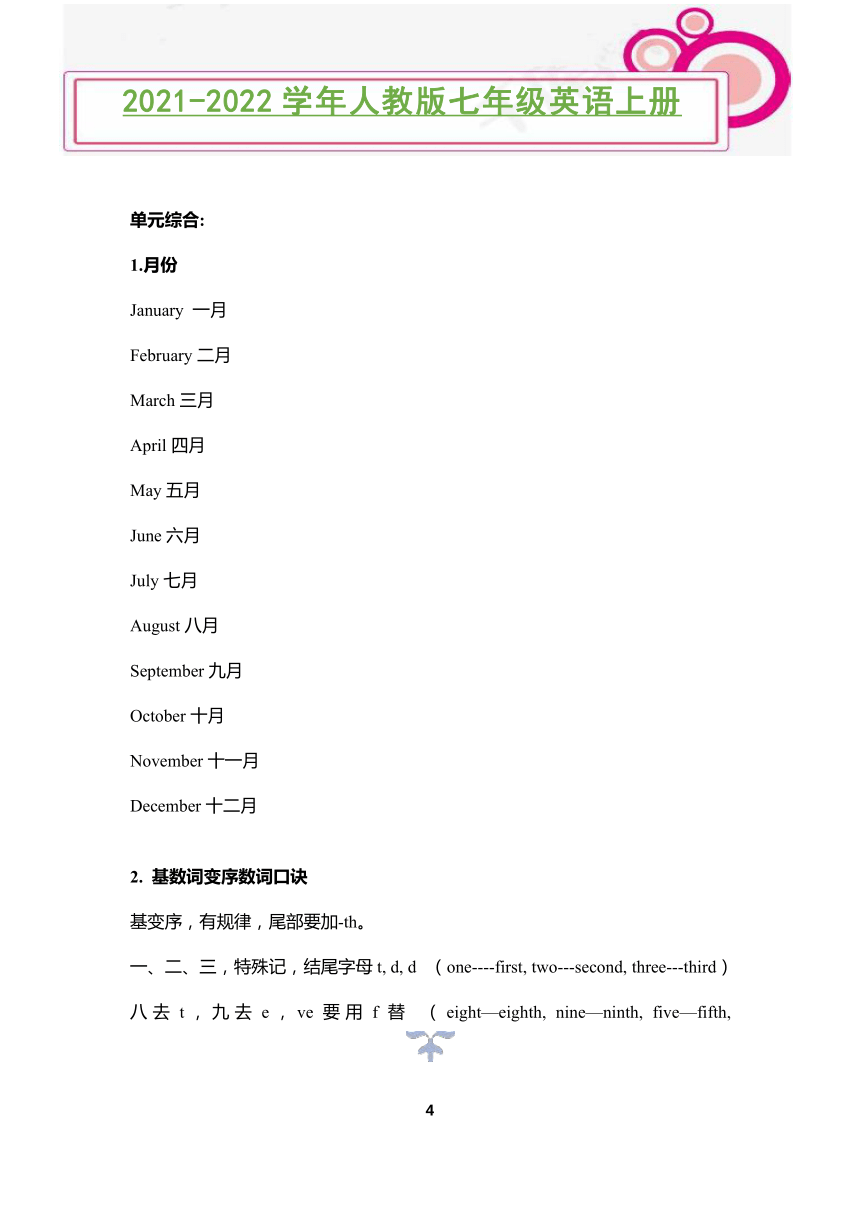2021-2022学年人教版七年级英语上册Unit 8 When is your birthday?Section A Grammar Focus Section B重要知识点讲解
文档属性
| 名称 | 2021-2022学年人教版七年级英语上册Unit 8 When is your birthday?Section A Grammar Focus Section B重要知识点讲解 |

|
|
| 格式 | doc | ||
| 文件大小 | 125.5KB | ||
| 资源类型 | 教案 | ||
| 版本资源 | 人教新目标(Go for it)版 | ||
| 科目 | 英语 | ||
| 更新时间 | 2021-08-20 00:00:00 | ||
图片预览




文档简介
Unit8
When
is
your
birthday?
重要知识点讲解
Section
A_Grammar
Focus_Section
B_综合
Section
A
一、日期的英文表达方式
2018.2.15
?February
fifteenth,two
thousand
and
eighteen
[点拨]
"月份
日期的序数词,年份"是日期的英文表达方式。如:
October
20th
2008
读作
October
twentieth
two
thousand
and
eight
二、名词所有格
[点拨]
名词所有格表示所有关系、所属关系等意义;
包括:“‘s”所有格、of所有格和双重所有格即所有格叠用这三种表现形式。
(1)对于没有生命的事物,其名词所有格常由of短语构成。
a
map
of
the
world一张世界地图
2)对于有生命的事物,其名词所有格形式一般在词尾加“‘s”;
以?s结尾的复数名词在词尾加“'
”。
如:
my
father’s
car我爸爸的轿车
Women’s
Day妇女节
(3)时间、距离、度量衡、价值、自然现象、国家、城镇等名词,可以加“'s”构成所有格。
today’s
newspaper今天的报纸
five
minutes'
walk五分钟的步行路程
(4)表示两者共同拥有的人或物(共有)时,后一个名词使用所有格形式即可。
如果表示两者各自的所属关系(各自所有),则每个名词都分别使用所有格形式。?
Joan
and
Jane's
room(房间属二人共同所有)
Joan's
and
Jane's
rooms(指Joan和Jane各自的房间)
(5)双重所有格:即“名词+of+普通名词的所有格或名词性物主代词”。
Grammar
Focus
一、询问某人的生日的句型
-When?is
your
birthday?你的生日是什么时候?
-My
birthday
is
on
May
2nd.我的生日是五月二日。
[点拨]
"When
is+one's
birthday?"用于询问某人的生日。
该问句表达式中的one's表示代词或者名词的所有格形式;
如:her/his;my
father's/mother's
该问句的回答形式:It's+介词+日期./One's
birthday
is+时间短语.
如:His
birthday
is
on
April
21st.他的生日是四月二十一日。
二、序数词
[点拨]
序数词指的是表示顺序的词。
由基数词变为序数词的方法如下:
1)第1,第2,第3:first,second,third
2)第4-第19:-th:
如:
fourth,(five)fifth,sixth,seventh,eighth,(nine)
ninth,
tenth,eleventh,(twelve)twelfth,thirteenth,fourteenth?
fifteenth,sixteenth,seventeenth,eighteenth,nineteenth.
3)第20--第90:y改为i再加eth.如:twentieth.
4)第21--第99:改个位的基数词为序数词即可。如:
twenty—one
改为
twenty—first
记忆口诀如下:
基变序,有规律,词尾加上th.1
2
3特殊记,词尾字母t,d,d
。
8少
t,9去
e,f来把v
e替。整十变y为ie,
后跟th莫迟疑。
若想表示几十几,只变个位就可以。
需注意:序数词的前面往往加定冠词the。但当序数词前有物主代词、指示代词等修饰时,则不必加the。如:
My
mother
is
my
first
teacher.我的妈妈是我的第一位老师。
(2)序数词可以用来表示顺序、编号等,但是应该放在名词的前面。
如:the
fifth
lesson
第五课
Section
B
一、询问对方喜欢什么活动的句型
What
activities?do
you
like?你喜欢什么活动?
I
like
school
trip.我喜欢学校郊游。
[点拨]
"What
activities
do
you
like?"用于询问对方喜欢什么活动。
activities是activity的复数形式。
问句的回答形式为:I
like+活动名词.
单元综合:
1.月份
January
一月
?
February二月
??
March三月
??
April四月
?
May五月
?
June六月
?
July七月
?
August八月
?
September九月
?
October十月
?
November十一月
?
December十二月
2.
基数词变序数词口诀
基变序,有规律,尾部要加-th。
一、二、三,特殊记,结尾字母t,
d,
d
?(one----first,
two---second,
three---third)
八去t,九去e,ve要用f替
(eight—eighth,
nine—ninth,
five—fifth,
twelve—twelfth)
?
?
y要改为ie
?
?(twenty—twentieth,
?thirty—thirtieth)
若是碰上几十几,只变个位就可以
(twenty-one---twenty-first,
thirty-four—thirty-fourth)
3.
date
of
birth(出生日期)=
birthday
4.
Happy
birthday!
生日快乐!
5.
问年龄用how
old
+be
+
主语?答:主语
+
be
+
基数词(years
old)
1)
How
old
are
you?
I’m
fifteen(years
old)
你多大了?我15岁。
2)
How
old
is
the
baby?
He
is
10
months
old.这个婴儿多大了?他10个月大。
6.at
/
on
/
in
表时间“在……”
1)at?通常表在某个点时间。at
8:00
?在8:00
?at
9:25
在9:25?
2)on通常表在某一天或某一天的上/下午、晚上。
on
September
1st
在9月1日
??
on
a
cold
morning
在一个寒冷的上午
3)in表在某一周/月/季节/年/世纪等。
in
1979
在1979年
??
in
September
在9月份?
in
spring在春天
表时间at
<
on
<
in
4)固定词组
at
dawn在黎明
at
noon在中午
?
at
night在晚上?
at
sunrise在黎明/日出时
at
Christmas在圣诞节
?
at
lunch
time在吃中饭时
?
at
this
/
that
time在这/那时?
at
the
age
of
20在20岁时
on
weekend(s)在周末?
in
the
morning
/
afternoon
/
evening在上午/下午/晚上
7.see
you./
Goodbye
/
Bye/
Bye-bye再见
see
you
later回头见;过一会儿见。
see
you
tomorrow/next
week.
明天见
/
下周见
see
you
then.
到时见。
8.have
a
good
time
表示“玩的开心”,
=
enjoy
oneself(oneself要随主语的变化而变化)
=
have
fun
They
are
having
a
good
time.
=
They
are
enjoying
themselves.=
They
are
having
fun.
他们正玩得高兴。
9.各种节日的英语?
1月1日元旦(New
Year's
Day)?
2月14日情人节(Valentine's
Day)?
3月8日国际妇女节(International
Women's
Day)?
3月12日中国植树节(China
Arbor
Day)?
4月1日愚人节(April
Fools'
Day)?
4月5日清明节(Tomb-sweeping
Day)?
5月1日国际劳动节(International
Labour
Day)?
5月4日中国青年节(Chinese
Youth
Day)?
6月1日
国际儿童节(International
Children's
Day)?
8月1日中国人民解放军建军节(Army
Day)?
8月12日国际青年节(International
Youth
Day)?
9月10日中国教师节(Teachers’
Day)?
10月1日国庆节(National
Day)?
10月31日万圣节(Halloween)?
12月25日圣诞节(Christmas
Day)?
5月第二个星期日母亲节(Mother's
Day)?
6月第三个星期日父亲节(Father's
Day)?
10月的第二个星斯一加拿大感恩节(Thanksgiving
Day)?
11月最后一个星期四美国感恩节(Thanksgiving
Day)?
农历节日?
农历正月初一春节(the
Spring
Festival)?
农历正月十五元宵节(the
Lantern
Festival)?
农历五月初五端午节(the
Dragon-Boat
Festival)?
农历八月十五中秋节(the
Mid-Autumn
Festival)?
2
When
is
your
birthday?
重要知识点讲解
Section
A_Grammar
Focus_Section
B_综合
Section
A
一、日期的英文表达方式
2018.2.15
?February
fifteenth,two
thousand
and
eighteen
[点拨]
"月份
日期的序数词,年份"是日期的英文表达方式。如:
October
20th
2008
读作
October
twentieth
two
thousand
and
eight
二、名词所有格
[点拨]
名词所有格表示所有关系、所属关系等意义;
包括:“‘s”所有格、of所有格和双重所有格即所有格叠用这三种表现形式。
(1)对于没有生命的事物,其名词所有格常由of短语构成。
a
map
of
the
world一张世界地图
2)对于有生命的事物,其名词所有格形式一般在词尾加“‘s”;
以?s结尾的复数名词在词尾加“'
”。
如:
my
father’s
car我爸爸的轿车
Women’s
Day妇女节
(3)时间、距离、度量衡、价值、自然现象、国家、城镇等名词,可以加“'s”构成所有格。
today’s
newspaper今天的报纸
five
minutes'
walk五分钟的步行路程
(4)表示两者共同拥有的人或物(共有)时,后一个名词使用所有格形式即可。
如果表示两者各自的所属关系(各自所有),则每个名词都分别使用所有格形式。?
Joan
and
Jane's
room(房间属二人共同所有)
Joan's
and
Jane's
rooms(指Joan和Jane各自的房间)
(5)双重所有格:即“名词+of+普通名词的所有格或名词性物主代词”。
Grammar
Focus
一、询问某人的生日的句型
-When?is
your
birthday?你的生日是什么时候?
-My
birthday
is
on
May
2nd.我的生日是五月二日。
[点拨]
"When
is+one's
birthday?"用于询问某人的生日。
该问句表达式中的one's表示代词或者名词的所有格形式;
如:her/his;my
father's/mother's
该问句的回答形式:It's+介词+日期./One's
birthday
is+时间短语.
如:His
birthday
is
on
April
21st.他的生日是四月二十一日。
二、序数词
[点拨]
序数词指的是表示顺序的词。
由基数词变为序数词的方法如下:
1)第1,第2,第3:first,second,third
2)第4-第19:-th:
如:
fourth,(five)fifth,sixth,seventh,eighth,(nine)
ninth,
tenth,eleventh,(twelve)twelfth,thirteenth,fourteenth?
fifteenth,sixteenth,seventeenth,eighteenth,nineteenth.
3)第20--第90:y改为i再加eth.如:twentieth.
4)第21--第99:改个位的基数词为序数词即可。如:
twenty—one
改为
twenty—first
记忆口诀如下:
基变序,有规律,词尾加上th.1
2
3特殊记,词尾字母t,d,d
。
8少
t,9去
e,f来把v
e替。整十变y为ie,
后跟th莫迟疑。
若想表示几十几,只变个位就可以。
需注意:序数词的前面往往加定冠词the。但当序数词前有物主代词、指示代词等修饰时,则不必加the。如:
My
mother
is
my
first
teacher.我的妈妈是我的第一位老师。
(2)序数词可以用来表示顺序、编号等,但是应该放在名词的前面。
如:the
fifth
lesson
第五课
Section
B
一、询问对方喜欢什么活动的句型
What
activities?do
you
like?你喜欢什么活动?
I
like
school
trip.我喜欢学校郊游。
[点拨]
"What
activities
do
you
like?"用于询问对方喜欢什么活动。
activities是activity的复数形式。
问句的回答形式为:I
like+活动名词.
单元综合:
1.月份
January
一月
?
February二月
??
March三月
??
April四月
?
May五月
?
June六月
?
July七月
?
August八月
?
September九月
?
October十月
?
November十一月
?
December十二月
2.
基数词变序数词口诀
基变序,有规律,尾部要加-th。
一、二、三,特殊记,结尾字母t,
d,
d
?(one----first,
two---second,
three---third)
八去t,九去e,ve要用f替
(eight—eighth,
nine—ninth,
five—fifth,
twelve—twelfth)
?
?
y要改为ie
?
?(twenty—twentieth,
?thirty—thirtieth)
若是碰上几十几,只变个位就可以
(twenty-one---twenty-first,
thirty-four—thirty-fourth)
3.
date
of
birth(出生日期)=
birthday
4.
Happy
birthday!
生日快乐!
5.
问年龄用how
old
+be
+
主语?答:主语
+
be
+
基数词(years
old)
1)
How
old
are
you?
I’m
fifteen(years
old)
你多大了?我15岁。
2)
How
old
is
the
baby?
He
is
10
months
old.这个婴儿多大了?他10个月大。
6.at
/
on
/
in
表时间“在……”
1)at?通常表在某个点时间。at
8:00
?在8:00
?at
9:25
在9:25?
2)on通常表在某一天或某一天的上/下午、晚上。
on
September
1st
在9月1日
??
on
a
cold
morning
在一个寒冷的上午
3)in表在某一周/月/季节/年/世纪等。
in
1979
在1979年
??
in
September
在9月份?
in
spring在春天
表时间at
<
on
<
in
4)固定词组
at
dawn在黎明
at
noon在中午
?
at
night在晚上?
at
sunrise在黎明/日出时
at
Christmas在圣诞节
?
at
lunch
time在吃中饭时
?
at
this
/
that
time在这/那时?
at
the
age
of
20在20岁时
on
weekend(s)在周末?
in
the
morning
/
afternoon
/
evening在上午/下午/晚上
7.see
you./
Goodbye
/
Bye/
Bye-bye再见
see
you
later回头见;过一会儿见。
see
you
tomorrow/next
week.
明天见
/
下周见
see
you
then.
到时见。
8.have
a
good
time
表示“玩的开心”,
=
enjoy
oneself(oneself要随主语的变化而变化)
=
have
fun
They
are
having
a
good
time.
=
They
are
enjoying
themselves.=
They
are
having
fun.
他们正玩得高兴。
9.各种节日的英语?
1月1日元旦(New
Year's
Day)?
2月14日情人节(Valentine's
Day)?
3月8日国际妇女节(International
Women's
Day)?
3月12日中国植树节(China
Arbor
Day)?
4月1日愚人节(April
Fools'
Day)?
4月5日清明节(Tomb-sweeping
Day)?
5月1日国际劳动节(International
Labour
Day)?
5月4日中国青年节(Chinese
Youth
Day)?
6月1日
国际儿童节(International
Children's
Day)?
8月1日中国人民解放军建军节(Army
Day)?
8月12日国际青年节(International
Youth
Day)?
9月10日中国教师节(Teachers’
Day)?
10月1日国庆节(National
Day)?
10月31日万圣节(Halloween)?
12月25日圣诞节(Christmas
Day)?
5月第二个星期日母亲节(Mother's
Day)?
6月第三个星期日父亲节(Father's
Day)?
10月的第二个星斯一加拿大感恩节(Thanksgiving
Day)?
11月最后一个星期四美国感恩节(Thanksgiving
Day)?
农历节日?
农历正月初一春节(the
Spring
Festival)?
农历正月十五元宵节(the
Lantern
Festival)?
农历五月初五端午节(the
Dragon-Boat
Festival)?
农历八月十五中秋节(the
Mid-Autumn
Festival)?
2
同课章节目录
- starters 预备篇(2012秋审查)
- Unit 1 Good morning !
- Unit 2 What’s this in English?
- Unit 3 What color is it ?
- Unit 1 My name's Gina.
- Section A
- Section B
- Unit 2 This is my sister.
- Section A
- Section B
- Unit 3 Is this your pencil?
- Section A
- Section B
- Unit 4 Where's my schoolbag?
- Section A
- Section B
- Unit 5 Do you have a soccer ball?
- Section A
- Section B
- Unit 6 Do you like bananas?
- Section A
- Section B
- Unit 7 How much are these socks?
- Section A
- Section B
- Unit 8 When is your birthday?
- Section A
- Section B
- Unit 9 My favorite subject is science.
- Section A
- Section B
